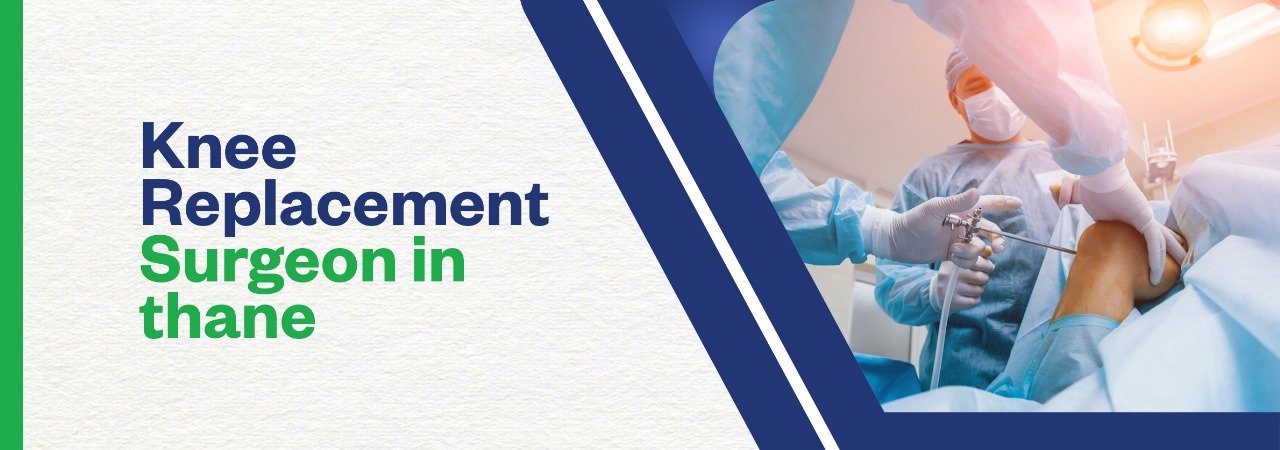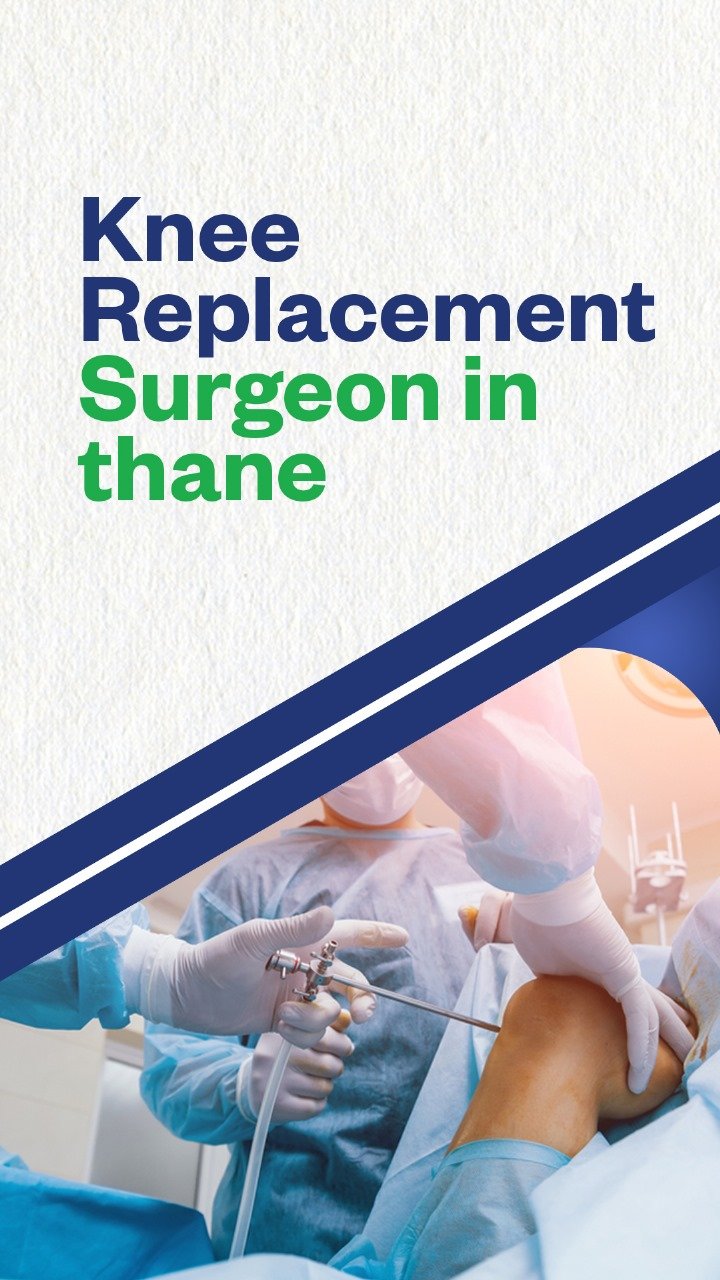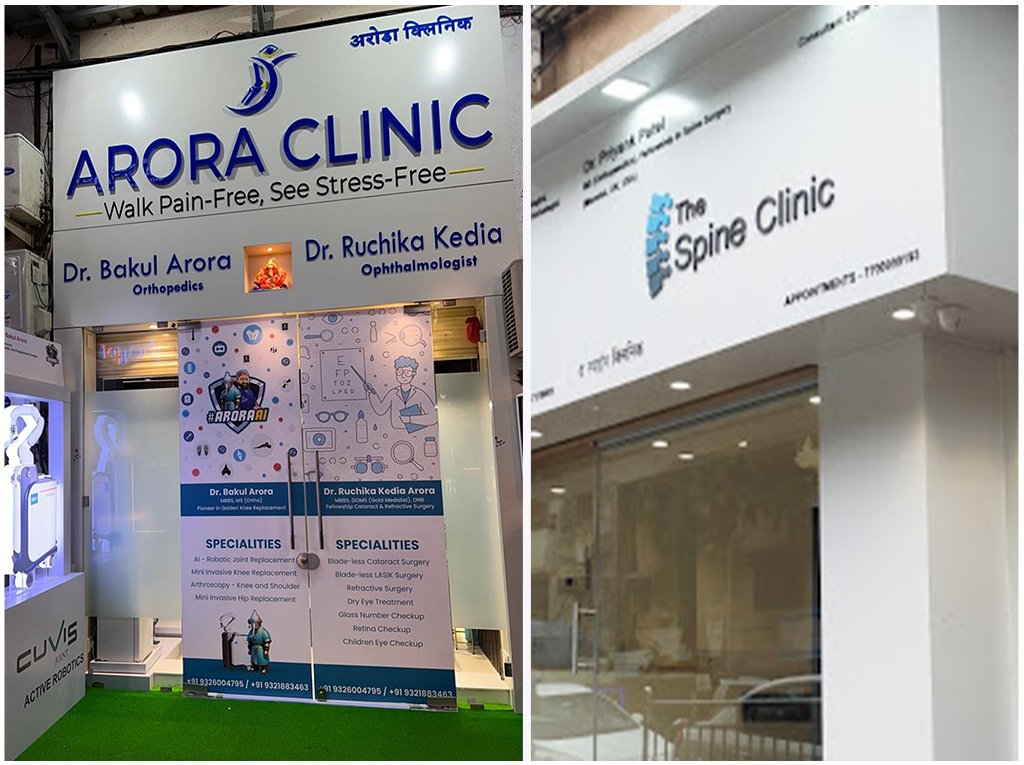

Welcome to the forefront of knee replacement surgeons in Thane, where Dr. Priyank Patel and Dr. Bakul Arora bring unparalleled expertise and dedication to patient care. As leading surgeons in the field, they blend advanced techniques and cutting-edge technologies to provide personalized solutions for knee-related concerns. With a commitment to comprehensive care and a track record of successful outcomes, these specialists stand as pillars of excellence, ensuring a path to restored mobility and a pain-free life for their patients.
In the realm of knee replacement surgery in Thane, two distinguished names shine brightly: Dr. Priyank Patel and Dr. Bakul Arora. Renowned as leading knee replacement surgeons and knee replacement specialists in Thane, these specialists bring a wealth of experience and innovation to their practice.

Dr. Bakul Arora, a consultant joint replacement and orthopedic surgeon, practices at the Arora Clinic. His expertise lies in minimally invasive techniques, offering patients a range of benefits. Dr. Arora employs the subvastus approach for knee replacement surgery and the direct anterior approach for hip replacement surgery. This groundbreaking technique ensures a nearly painless surgery with a rapid recovery period. Patients often experience the remarkable advantage of walking on the same day as the surgery, climbing stairs on the second day, and being discharged within three days. Dr. Arora’s stitchless surgery approach minimizes blood loss, eliminates the need for blood transfusion, and reduces the requirement for physiotherapy. His dedication is evident in his mission to comfort patients and alleviate the fear associated with knee and hip replacement surgeries.
On the other hand, Dr. Priyank Patel specializes in the surgical and non-surgical management of spine-related disorders, particularly spine tumors. As one of the youngest independent surgical consultants in India, Dr. Patel has garnered recognition for his expertise. His extensive international training includes complex surgical procedures like minimally invasive spinal surgery, computer-assisted spinal surgery, microsurgery, athletic spinal injuries, and motion-preserving procedures such as artificial disc replacement. While surgery is his forte, Dr. Patel advocates for a conservative approach whenever possible, emphasizing an active lifestyle with corrective exercise. His commitment extends beyond his role as a surgeon, as he actively contributes to philanthropic work through initiatives like Rural Spine Care Centers across India.
Together, Dr. Priyank Patel and Dr. Bakul Arora stand as pillars of excellence, not only for their surgical prowess but also for their dedication to patient well-being and advancement in the field of orthopedics. Their collective vision reflects a commitment to providing the best possible care and a positive impact on the lives of their patients in Thane and beyond.
Knee replacement surgery, also known as knee arthroplasty, is a medical procedure designed to alleviate chronic pain and improve function in a damaged or diseased knee joint. This surgical intervention involves-
Knee replacement surgery is often recommended for individuals with severe arthritis, joint deformities, or injuries that significantly impact their daily activities and quality of life. The procedure is commonly performed by a specialized medical professional known as a knee replacement surgeon in Thane. These surgeons, also recognized as knee specialists in Thane, aim to provide patients with a functional and pain-free knee joint, facilitating a return to an active and comfortable lifestyle.
There are several types of knee replacements, each tailored to address specific conditions and individual patient needs. The main types include-
The choice of knee replacement type depends on factors such as the extent of joint damage, overall health, and the specific goals of the patient. Orthopedic surgeons, including knee replacement surgeons in Thane and knee operation specialists in Thane, work closely with individuals to determine the most suitable option for their unique circumstances.
A top-notch knee replacement surgeon possesses a combination of skills, expertise, and qualities that contribute to successful patient outcomes and overall excellence in their field. Some key qualities include:
Dr. Priyank Patel and Dr. Bakul Arora, the esteemed knee replacement surgeons in Thane, embody all these qualities. With their extensive expertise, commitment to patient-centric care, and continuous pursuit of excellence, they provide not only successful surgeries but also a reassuring experience for their patients throughout the entire treatment journey.
Knee replacement surgery becomes necessary when individuals experience severe pain, reduced mobility, and a decline in overall quality of life due to conditions affecting the knee joint. Common reasons for considering knee replacement surgery include:
The decision to undergo knee replacement surgery is typically a collaborative one between the patient and their healthcare team. Orthopedic surgeons, including knee replacement surgeons in Thane and knee replacement specialists in Thane, assess the severity of the condition, considering factors like age, overall health, and the impact of knee issues on daily life. The goal of knee replacement surgery is to relieve pain, restore function, and improve the patient’s overall quality of life.
Personalized care and treatment plans are fundamental elements in providing comprehensive and effective healthcare. This approach tailors medical interventions to the unique needs, preferences, and circumstances of each individual patient. Here are key aspects of personalized care and treatment plans:
Personalized care and treatment plans reflect a commitment to addressing the uniqueness of each patient, fostering better health outcomes, and enhancing overall patient satisfaction. This approach acknowledges the diverse needs of individuals and strives to create a healthcare experience that is tailored, supportive, and ultimately more effective.
Addressing common concerns and misconceptions in healthcare is crucial for fostering informed decision-making and promoting a better understanding of medical conditions and treatments. Here are some prevalent concerns and misconceptions:
Addressing these concerns and misconceptions promotes a more transparent and collaborative healthcare environment, empowering patients to actively engage in their health journey and make well-informed decisions about their care.

Rehabilitation and recovery play integral roles in the healing process after medical interventions, surgeries, or injuries. These components are designed to restore functionality, alleviate pain, and enhance overall well-being. Key aspects of rehabilitation and recovery include:
Rehabilitation and recovery are dynamic processes that require commitment from both healthcare providers and patients. A well-structured and individualized approach ensures that individuals regain function, mobility, and a high quality of life following medical interventions or injuries.
Choosing a knee replacement surgeon in Thane provides patients with the assurance of state-of-the-art technology, exceptional infrastructure, experienced medical professionals, and readily available medical resources, ultimately enhancing the overall quality and effectiveness of knee replacement procedures.
In conclusion, Dr. Priyank Patel and Dr. Bakul Arora, renowned knee replacement surgeons in Thane, epitomize excellence in orthopedic care. Their commitment to advanced techniques, personalized patient solutions, and compassionate care distinguishes them in the field. Thane, with its cutting-edge technology and top-notch infrastructure, offers an ideal backdrop for these specialists. The collaborative efforts of Dr. Patel and Dr. Arora ensure not only successful surgeries but also a profound positive impact on patients’ lives. The journey to restored mobility and a pain-free life finds its epitome in the expertise and dedication of these distinguished knee replacement surgeons in Thane.



At The Orthopedic Clinic, we pride ourselves on providing the best care possible to our patients. We believe in treating the individual patient, not just their injury. Since our beginning in the Daytona Beach community in 1961, our goal has been to help our patients live their life in full motion through trusted, respectful, and cutting-edge orthopedic care. We have specialist Orthopedic Surgeon in Mumbai.











Dr. Bakul Arora is a Consultant Joint Replacement & Orthopaedic Surgeon is one of the leading Knee Replacement Surgeon in Thane and Mumbai with over 4000+ successfully surgeries. Dr. Bakul Arora specialises in Mini-invasive techniques which offer multiple benefits to patients. He does the surgery using Subvastus approach for Knee Replacement surgery and Direct Anterior Approach for Hip replacement Surgery . This new techniques has many advantages for patients like its pain-less , stich-less surgery, patients walks on the same day after surgery, no blood loss, faster recovery etc.


Knee replacement is required for advanced arthritis of the knee joint, producing painful limitation of movements and restriction in activities of daily living. Knee replacement as a solution should be offered when all non–surgical methods of treatment failed and painkiller medicines and injections also failed to reduce the Knee and hip pains.
Knee replacement can be total or unicondylar, depending on the number of compartments involved. Among the total knee replacement, there are two popular designs- Cruciate Retaining, and Posterior Stabilized. The decision for the design is best taken by the operating orthopedic surgeon based on the integrity of ligaments. Patella resurfacing as a routine is a debatable subject.
Yes, most knee replacement surgeries are minimally invasive, with numerous benefits to the patient, including smaller incisions, less tissue trauma, bleeding and post–operative pain, shorter hospital stays, faster recovery, and earlier return to work and activities — in weeks rather than months. Advantages of Minimally Invasive Knee Replacement Surgery. Patients Start walking in few hours of surgery. Patients start climbing the staircase from second day of his surgery. Patients Discharge with in 3 Days from the Hospital after surgery. No blood loss during the surgery, no blood Transfusion required. Less Physiotherapy.( No Physiotherapist required for home) Less Antibiotic. Stitchless Surgery. Recovery time is just two – three week.
Bilateral knee replacement in the same sitting, can be performed if both the knee joints are damaged to the same extent, however, the medical condition of the patient, and bone quality must be kept in consideration.
Surgery through Minimally Invasive technique patients start walking on the same day and staircase climbing starts from the second day of surgery. Patients can resume his work after 3 – 4 week.
The most significant risks include Infection, Deep vein thrombosis,and Aseptic loosening of implants. The risks correlate with the co-morbid medical condition, and must be discussed with the patient before surgery.
Patients normally require hospitalization for 3-4 days in single knee replacement, and up to 5-6 days in both knee replacement surgery
A single knee replacement takes approximately 90 min- 2 hours. Both knee replacement surgery takes approx 2-3 hours.
Years ago, knee replacement surgery was reserved for elderly patients due to a high complication rate and lack of implant durability. Modern techniques have allowed orthopaedic surgeons to base surgical decisions on a patient’s pain and disability, and not necessarily chronological age. Most patients who undergo knee replacement are between the ages of 50 and 80, but surgeons evaluate patients individually and primarily on their physiologic age and demands.
Patients can resume his/her light work after discharge from the hospital, no need for rest.
Patients are given epidural anesthesia for surgery, and post op pain relief. They are expected to follow instruction from physiotherapist regarding muscle training.
⇒ Wockhardt Hospital Mumbai Central, Mira road & Vashi
⇒ Apollo Spectra Hospital, Tardeo and Chembur
⇒ Cloud 9 Hospital, Malad
⇒ Criticare Hospital, Andheri
⇒ Arora Clinic, Hiranandani Meadows
⇒ Bethany Hospital, Vasant Vihar
⇒ Currae Hospital, Kapurbawdi
⇒ Horizon Hospital, Ghodbunder
⇒ Infinity Hospital, Majiwada
⇒ Lakecity Hospital, Khopat
⇒ Oscar Hospital, Majiwada
⇒ Drone Hospital, Bhiwandi
WhatsApp us